Doug Ford Cancelled Ontario’s Basic Income Pilot Experiment Because It Was Working

Ontario should demand the completion of the OBIP experiment in the name of empirical evidence and human research ethics
Update: Since my publication of this article, two surveys were completed to get at least some data about the effectiveness of the OBIP experiment.
A crime took place in Ontario at the end of July, 2018. The perpetrator was Doug Ford, the new Progressive Conservative Premier of Ontario, and the victim was the Ontario Basic Income Pilot (OBIP) experiment that had begun under the previous government, where 4,000 people in Ontario in four different cities (Hamilton, Brantford, Thunder Bay, and Lindsay) had recently just begun receiving — instead of the existing conditional welfare benefits for the unemployed and disabled — an unconditional income boost, based simply on the amount of income they were earning, with an additional boost for those with disabilities.
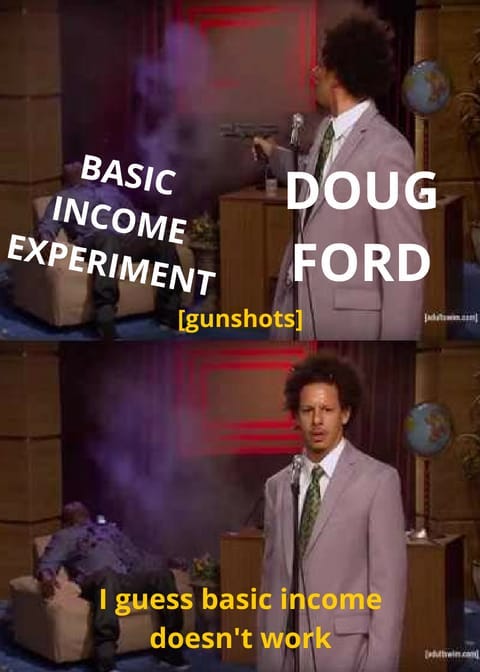
The goal of the three-year $150 million scientific experiment was to determine the effects of directly increasing people’s incomes without conditions in comparison to a control group of 2,000 people. What would be discovered after three years of data gathering? Would people in the experimental condition do more work or less? What kind of work would be accepted or avoided? Would incomes from employment increase or decrease? Would productivity improve? Would there be an economic stimulus? Would business startup rates increase? Would education rates increase? Would grades improve? Would health care expenses fall? Would mental health improve? Would crime rates decrease? Would the existing burden on the criminal justice system be lightened? Would household partner violence fall?
There are so many questions to ask about the effects of basic income, and so the government under the previous Premier of Ontario, Kathleen Wynne, turned to the scientific method to help answer these questions. No amount of arguing and debate will ever reveal the truth of whether it’s raining or not as well as opening a window and sticking your hand outside will. Science is a tool for determining objective reality. This is also why some people are anti-science. Some people reject reality. Some people have no interest in determining what is and what isn’t. Some people believe reality tends to be inconvenient and contrary to their emotional and economic interests.
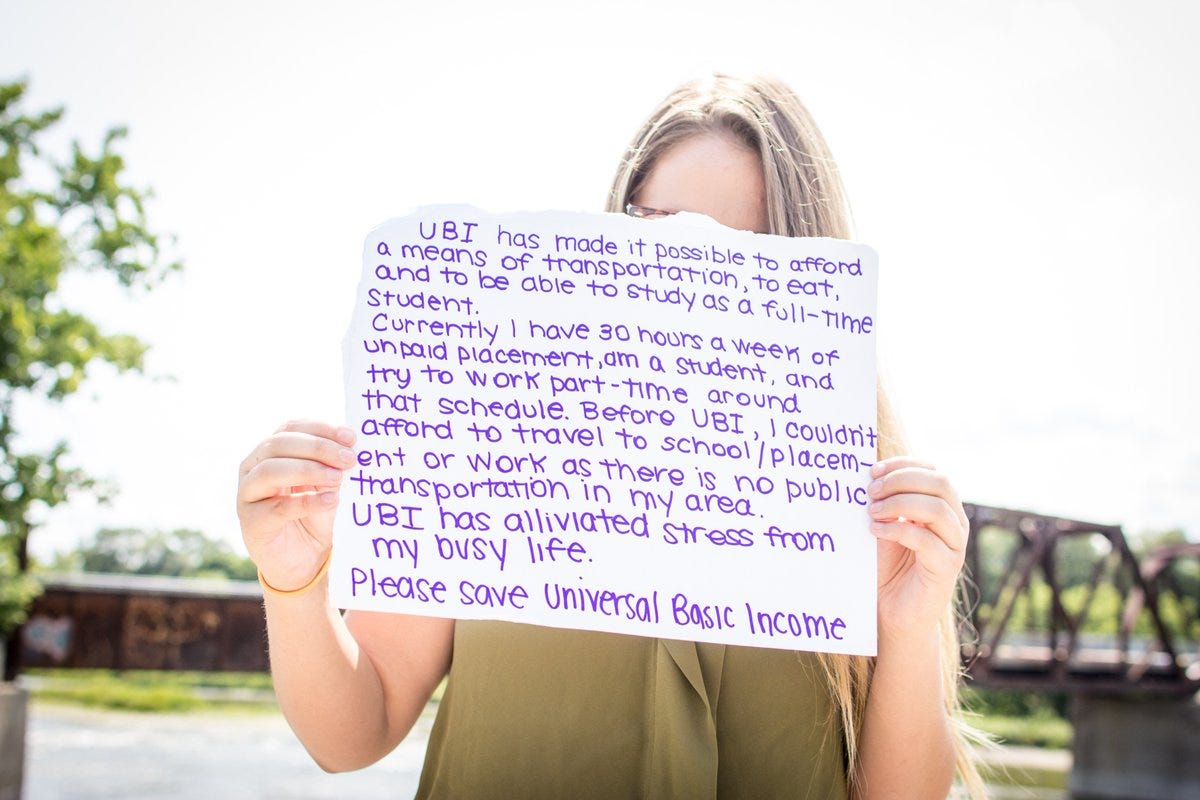

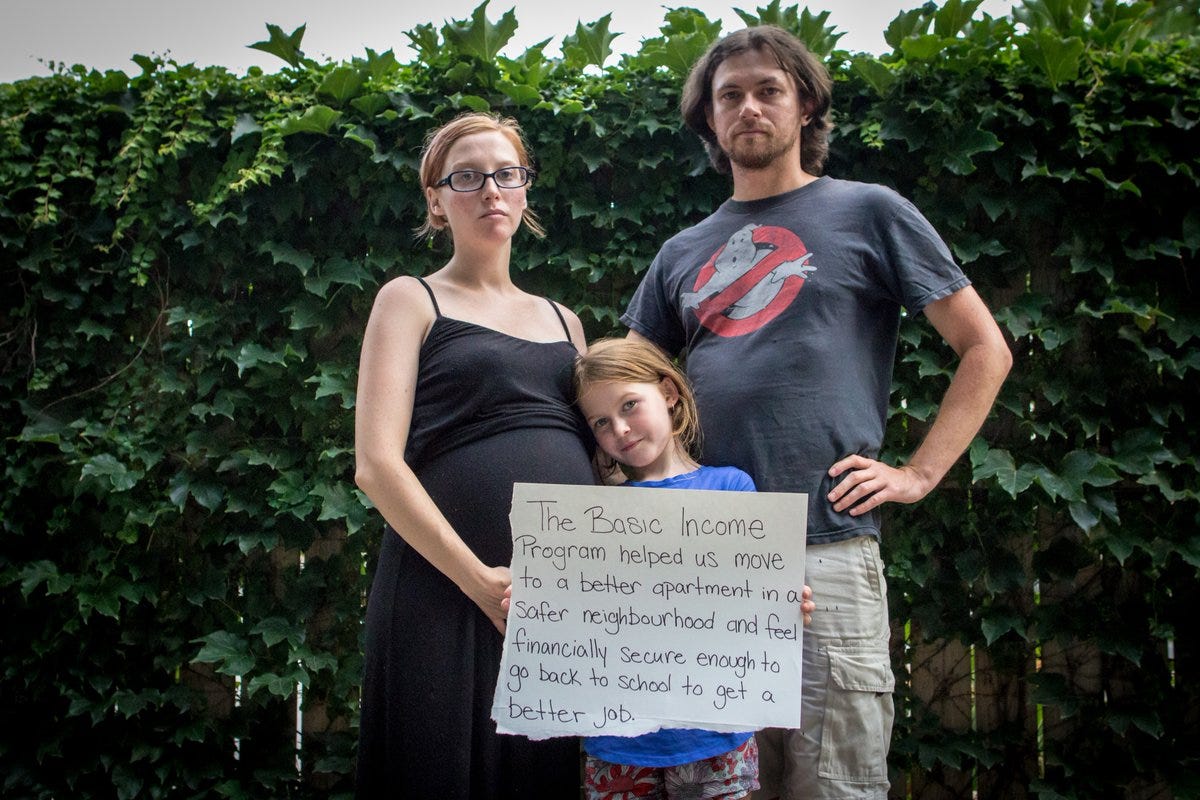
Doug Ford — as well as his Community and Social Services Minister Lisa MacLeod — are apparently among those for whom objective reality is somewhat of a nuisance. We can safely assume this because they had the opportunity to build an evidence-based case against basic income, and they chose not to gather that evidence. Their reasoning is clearly ideological, because first, the only official data gathered so far was baseline data to compare future data against, second, they’ve changed their story repeatedly, and third, if there was evidence already pointing towards it being a failure, the best possible thing to do would be to sit back and watch it fail.
Come 2020, with three years of data at their disposal in support of basic income having negative consequences, they could have then built a solid case against basic income, putting it to rest as an option. But they didn’t do that. Thus we can only really conclude one thing: The basic income experiment was working, and therefore it could not be allowed to continue. Were the experiment allowed to finish, there would then be an even larger mountain of evidence than there already is in favor of basic income as a better policy. That could not be allowed. The experiment had to be ended before enough data was created to inform an evidence-based policy decision.
There’s a way to test this hypothesis too. Become one of the voices demanding that Ford continue the experiment as he himself promised he would prior to and after his election. If he believes that basic income is a bad idea, and he does care about evidence, then he will continue the experiment in order to produce irrefutable evidence against basic income. If he refuses to continue the experiment beyond the March 31, 2019 date he’s now set as its official cancellation date, then he does not care about evidence, and he’s forming his opinion of basic income in the absence of evidence, and even in spite of it.


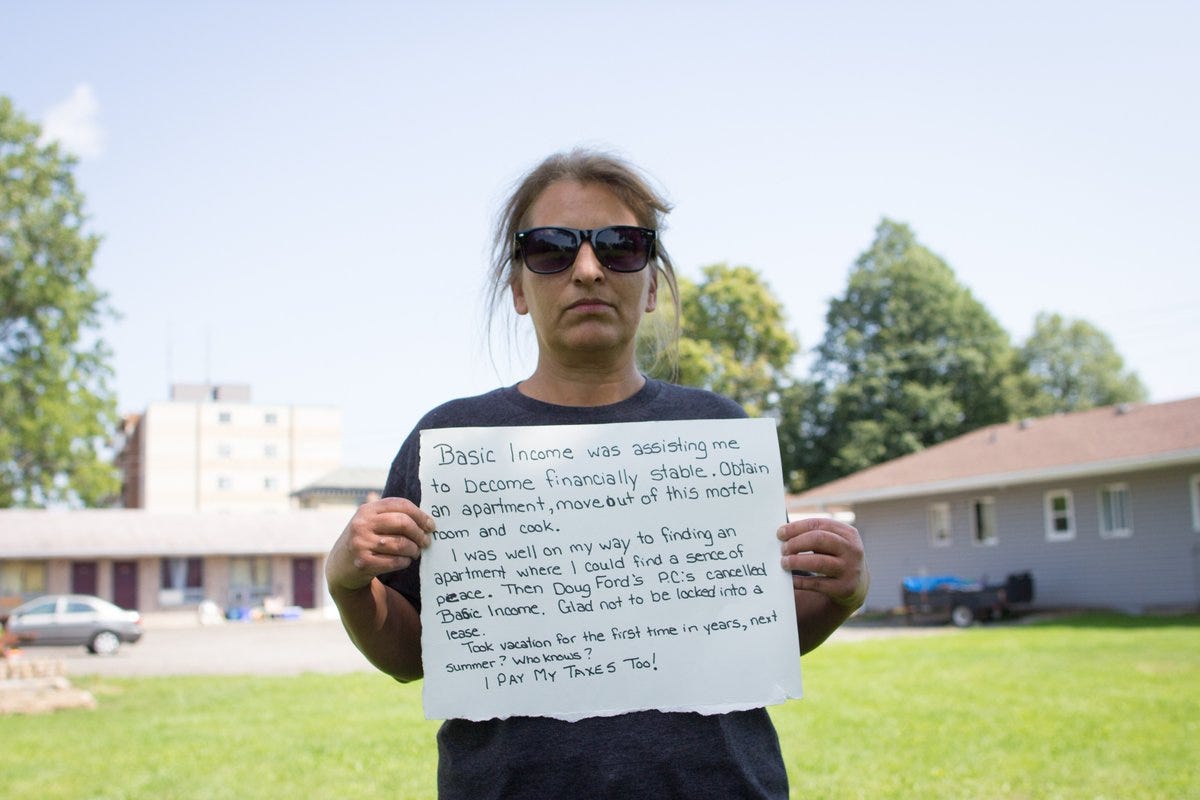
I absolutely welcome Ford reversing course and deciding that scientific evidence should inform government decisions. In fact, aside from the evidence already learned in Canada decades ago from the 1974–1979 Mincome experiment, and the evidence gained from other basic income experiments and unconditional cash transfer programs all over the world, let me help by sharing some of the anecdotal evidence actively being gathered now from the new firsthand accounts shared both before and since Ford announced the Ontario Basic Income Pilot’s cancellation.
The Living Proof
Let’s start with Angel. Prior to receiving basic income, Angel had been engaged in sex work for survival. With basic income, she was enabled to transition out of sex work and to begin pursuing a degree in medical administration. If the basic income experiment is not saved, that will end, and her sex work for survival will most likely resume.
Is that what Ford supports? Would Ford prefer his constituents be coerced into selling their bodies instead of opting to better their minds?
Prior to receiving basic income, Dave Cherkewski had on multiple occasion considered ending his life of long-term poverty. With basic income, he was immediately affordably housed, and finally freed to begin making long-term plans, among which included the creation of a work co-op for people with disabilities by people with disabilities. If the basic income experiment is not saved, survival itself will again become his full-time job.
Is that what Ford supports? Would Ford prefer his constituents spend all their time just trying to survive and even considering death as an option, instead of creatively engaging in their communities as happier citizens?
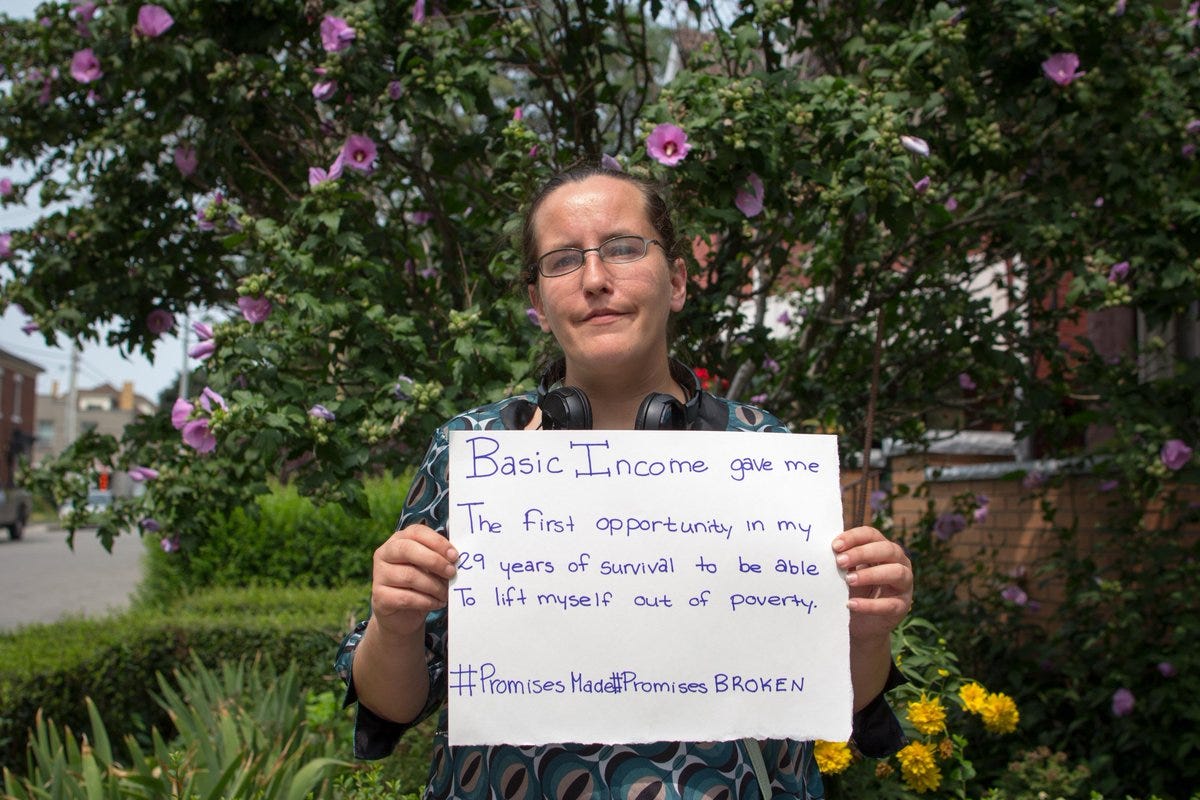
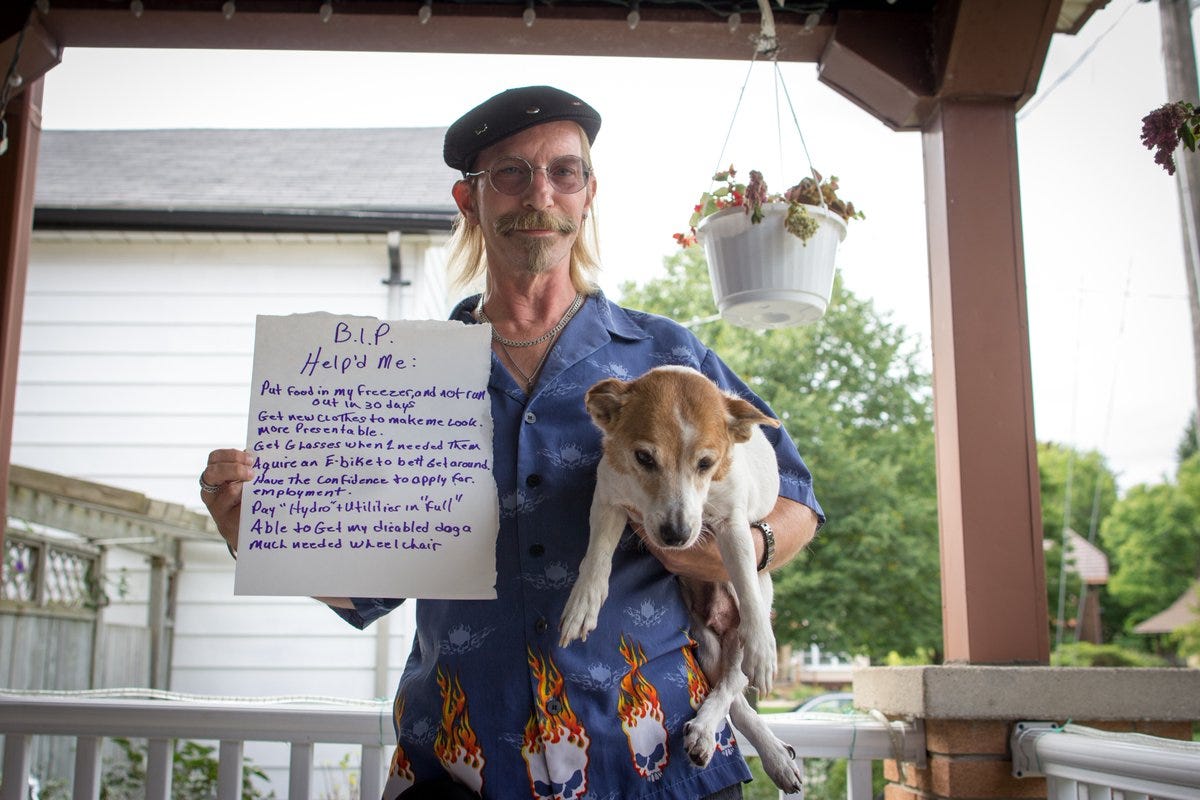

Prior to receiving basic income, Lindsay Boyd needed to go to food banks every month and was thus limited to processed foods. Bankrupted twice by high interest payday loans, Lindsay was finally able to begin building savings instead of debt. She was also finally able to include fresh fruits and vegetables into her diet. If the basic income experiment is not saved, there go her savings and her healthier eating.
Is that what Ford supports? Would Ford prefer his constituents build debt instead of savings, and eat poorly instead of healthy?
Prior to receiving basic income, Eric Chiodi had been disabled thanks to a car crash and lived a life of constant pain. With basic income, he was able to afford therapy to live in a little less pain. He was also able to begin paying off his back taxes that were threatening the loss of his house. If the basic income experiment is not saved, his pain will be back, and his house may be lost.
Is that what Ford supports? Would Ford prefer his constituents live in pain and be unable to pay their share of taxes?
Prior to receiving basic income, Sue Paskoski was discouraged from earning too much working because it would mean the loss of her disability benefits. She also couldn’t afford a car. With basic income, she was able to buy a car and begin working as a cleaner to earn additional income. If the basic income experiment is not saved, she will not be able to work without losing her benefits, and will then also not be able to afford her car payments.
Is that what Ford supports? Would Ford prefer his constituents stay home and not work, and not be able to buy economy-stimulating goods like cars?
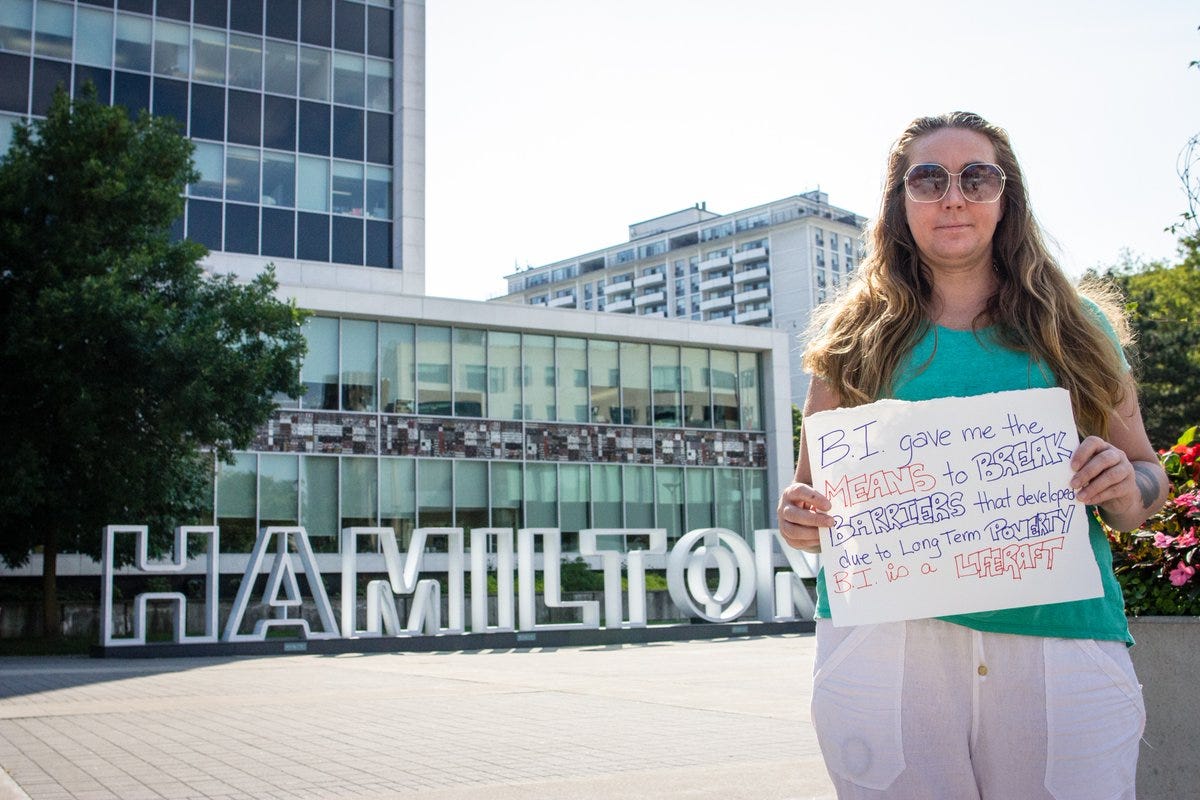


Prior to receiving basic income, Steve Pelland was homeless and found it extremely difficult to find a job because most of the available jobs are late shift, but the homeless shelter doesn’t allow day sleeping. With basic income, he was not only able to afford housing, but he was also able to begin learning a trade to eventually get a middle class job. If the basic income experiment is not saved, he will certainly not be able to continue learning a trade, and will most likely end up homeless again.
Is that what Ford supports? Would Ford prefer his constituents stay homeless and unemployed instead of housed and paying taxes on middle class incomes?
Prior to receiving basic income, Roland Singleton had been homeless amidst dried up construction work. With basic income, Roland was able to afford housing and also enrollment into a two-year college electrician program. If the basic income experiment is not saved, he’s one of the lucky few who will likely be okay because his basic income made such a big difference so quickly.
How can Ford not support this outcome? Would Ford prefer that his constituents be unable to become skillfully employed and instead live on the streets looking for work where they can find it?
Video: Ontario's Basic Income Was 'A Blessing' To These Small Business Owners
Luis and Leanna Segura of Lindsay, Ont. were struggling to pay the bills at home, while keeping their new restaurant up…
www.huffingtonpost.ca
Prior to receiving basic income, Luis and Leanna Segura were small business owners with four kids. Creating a new business while balancing a family together was a real challenge. With basic income, the stress of covering bills at home was lifted, enabling them to grow their business with less worry. They also noticed an uptick in customers and what customers were spending due to their customers also being part of the basic income experiment and having more money to spend. If the basic income experiment is not saved, their business is more likely to fail instead of expanding to new locations.
Is that what Ford supports? Would Ford prefer the small businesses of his constituents fail? Does Ford prefer an Ontario with fewer customers with less money to spend into their local economies?
Dashed hopes: Hamilton photographer puts faces to basic-income victims
Jessie Golem has created a photo essay of people like her who were negatively affected when the Ford government cancelled the basic income pilot program.
www.thespec.com
Prior to receiving basic income, Jessie Golem had four different jobs and even squeezed in freelance work between them in the never-ending battle to afford rent. With basic income, Jessie was finally able to take a deep breath, and with tears of joy streaming down her face, feel security for the first time. She gained the freedom to begin focusing on developing her role at a non-profit that’s helping grow grassroots organizations all over the world. If the basic income experiment is not saved, the exhaustion of daily survival will be placed back on her shoulders, and her newfound sense of security destroyed.
Is that what Ford supports? Would Ford prefer his constituents work four jobs just to get by, and live day after day with the weight of survival on their shoulders, unable to focus on the potential to positively impact our entire world?
It’s not too late for Ford to reverse his course reversal. He now has until the end of March 2019. He obviously made his decision to cancel the basic income experiment without looking at any of the available evidence, because the only data gathered was data to create the baseline. Nor did he sit down with any of the basic income recipients with the intention of gaining at least some understanding of how the experiment was working or even not working for them. But since his decision, an increasing number of personal stories have been shared of just how well the experiment was indeed working for the participants. There’s no excuse now for going ahead with this decision in light of all the positive stories available to listen to and learn from.
In fact, Jessie Golem — one of the above-mentioned basic income recipients — is now using her basic income to collect and share these many stories as part of an ongoing photography project she has begun. The project is called Humans of Basic Income (@HumansBasic on Twitter) and you’ve actually been looking at the photos while reading this. Jessie has also begun touring each of the basic income pilot areas to meet more of her fellow basic income recipients who want to visually share their stories. Stories like this one of a mother who was able to keep her baby daughter because of basic income…
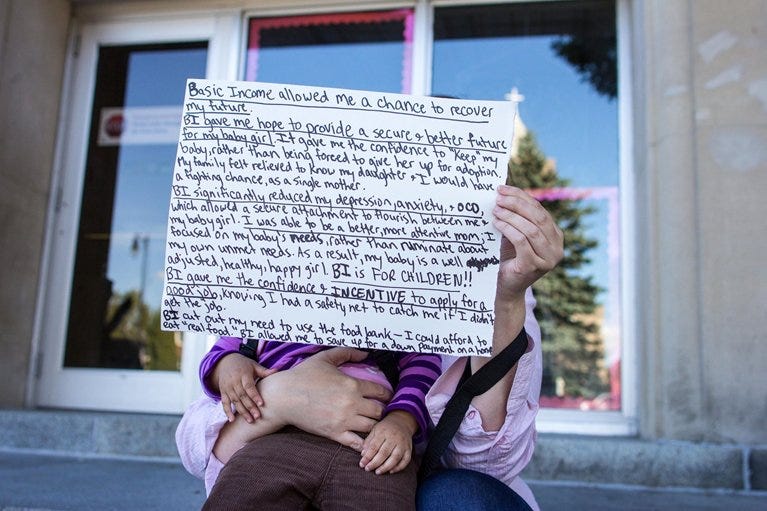
Basic income allowed me a chance to recover my future. UBI gave me hope to provide a secure and better future for my baby girl. It gave me the confidence to “keep” my baby, rather than being forced to give her up for adoption. My family felt relieved to know my daughter and I would have a fighting chance, as a single mother. UBI significantly reduced my depression, anxiety, and OCD, which allowed a secure attachment to flourish between me and my baby girl. I was able to be a better, more attentive mom; I focused on my baby’s needs rather than ruminate about my own unmet needs. As a result, my baby is a well adjusted, healthy, happy girl. UBI is FOR CHILDREN!! UBI gave me the confidence and INCENTIVE to apply for a good job, knowing I had a safety net to catch me if I didn’t get the job. UBI cut out my need to use the food bank — I could afford to eat “real food.” UBI allowed me to save up for a down payment on a home.
Basic income gave a basic income recipient the confidence to keep her baby. Stop for a moment and think about that. A mother was able to afford to keep her child because of the basic income pilot. The effects of it are that big, as are the effects of not having basic income.
Jessie’s project is also not the only way of learning what was happening in the basic income pilot from those taking part in it. A blog has been setup for basic income recipients to share their stories of how their lives have changed as a result of it. The blog is called Basic Income Voices and I encourage everyone reading this to read those stories too, to learn for yourself directly from recipients what Doug Ford and Lisa MacLeod refuse to acknowledge, that basic income demonstrably works, and in thousands of ways no bureaucratic system of gatekeepers and string-pullers ever could.
The Ford administration would instead like everyone to believe that the basic income experiment is too expensive.This all too common notion is wrong-headed. It doesn’t look at the effects of basic income, effects which the experiment was built to measure. From the firsthand accounts of basic income recipients, we know many were for the first time enabled to find housing, to find employment, to find better jobs, to pursue their educations, to improve their skills, to eat better, to live with less stress, to build their businesses, and to spend their money into their local economies. It is abundantly clear from all of this that tax revenue would have likely increased and spending on the costs of poverty like health care and crime would have likely decreased.
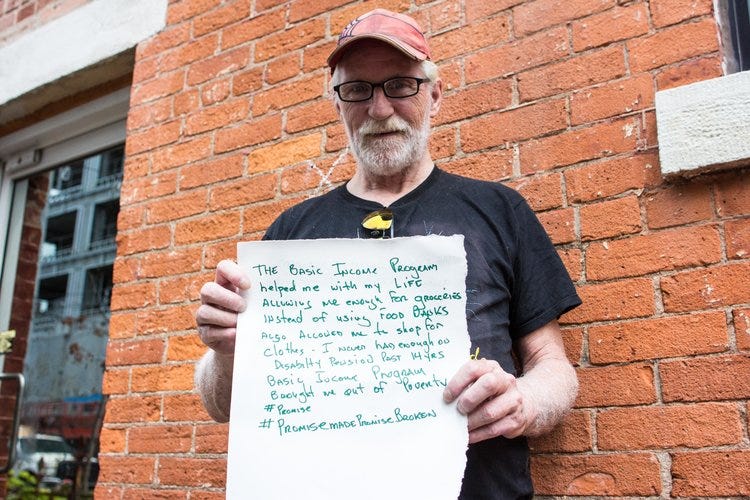


The full cost of poverty is crucial to understanding the cost of basic income. If the total cost of the basic income experiment was to be $150 million at the end of three years, that may sound expensive, but what if spending elsewhere had been discovered to fall by $100 million, and what if tax revenue from a larger tax base and a larger GDP had increased by $100 million? In that case, Ontario would not be out $150 million. It would be up $50 million more than it would have had it not done the experiment. It would have gotten richer.
Coming out ahead with basic income is an entirely realistic possibility. The cost of poverty in Ontario is estimated as being $32-$38 billion per year. What if implementing basic income Ontario-wide reduced that cost to $0, and grew Ontario’s GDP from $652 billion to $752 billion? Isn’t that outcome something worth investing $43 billion on basic income to achieve? An Ontario with a higher GDP per capita would mean more tax revenue without raising anyone’s tax rates. An Ontario without basic income is not without cost. Poverty is not free. Poverty costs everyone, everywhere, all the time.
The ability to make this calculation is why all of Ontario, and even all of Canada, needs to demand that Ford continue the experiment. Yes, basic income involves spending more money, but it also involves making more money and saving more money. The question is how much of each? What’s the answer? That’s what scientific experimentation is for!
The people of Ontario can’t know the answers and never will, unless Ford keeps his promise and sees the experiment through to completion. If Ontario is tired of spending money it doesn’t need to spend, and wants its people and its businesses to earn more money, it will do what needs to be done to keep the promise, complete the experiment, and save the basic income recipients. Anything less is not only anti-science, it’s criminal.
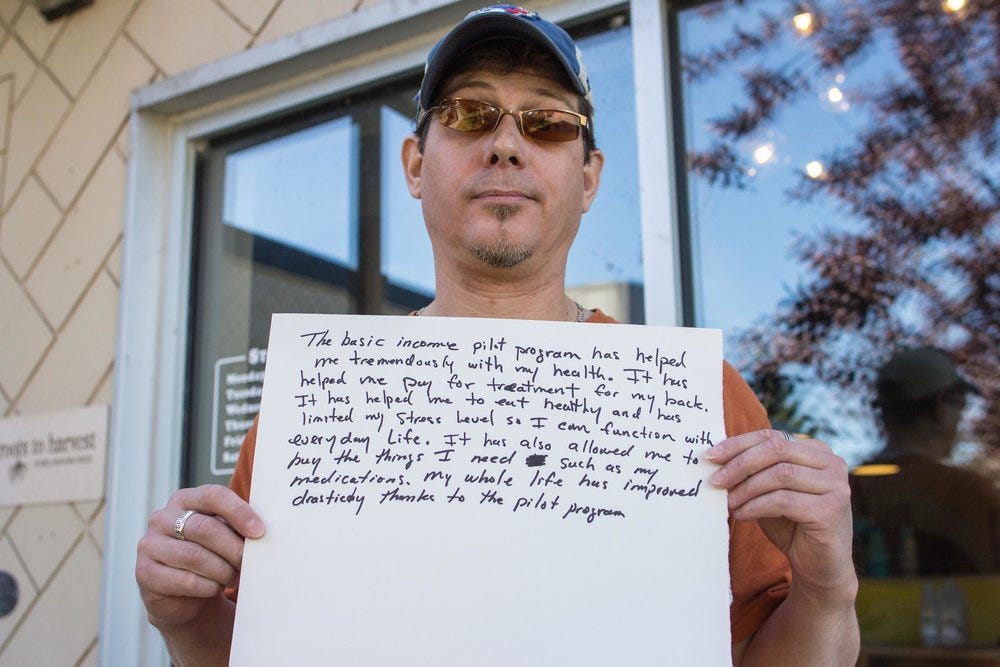
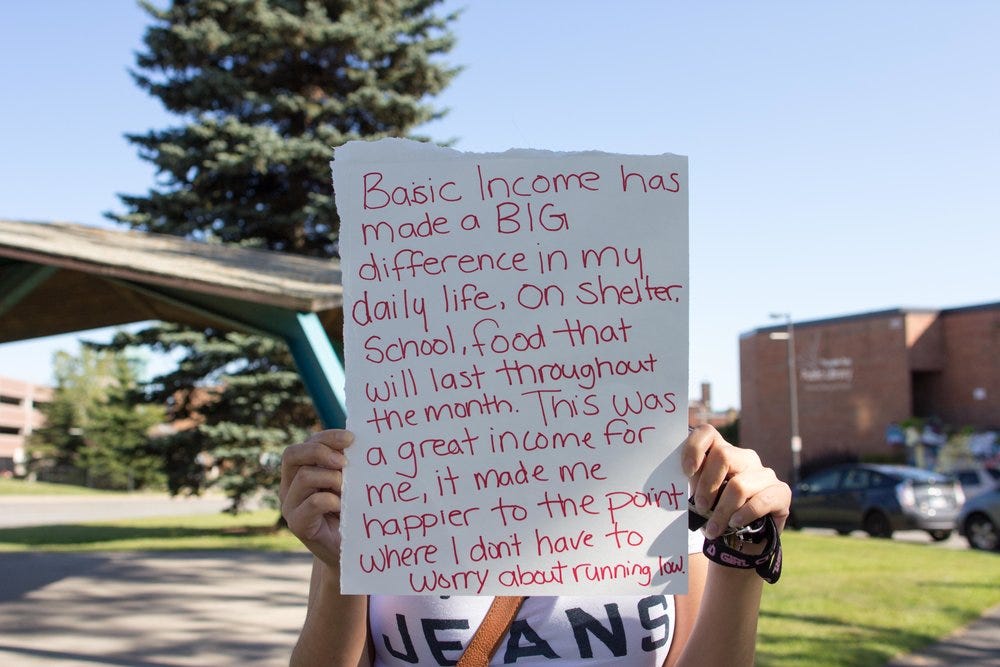

This is also why an open letter to Ford and MacLeod has been written and signed by a collection of principal investigators, research teams, and stakeholder groups behind basic income experiments around the world. The evidence being gathered was going to benefit not just Ontario, but the planet.
We must also never forget that basic income research involves experimenting with human beings, and such experimentation must meet the highest of ethical standards. As stated in the open letter, “standards for the ethical conduct of social experiments involving humans have evolved significantly in recent years. Not only is the cancellation inconsistent with international best practices, but it violates Canada’s own policy for the ethical conduct of experiments involving humans.”
It cannot be ignored that the cancellation of a three-year experiment involving real live human beings is an ethical violation of the most serious kind, the kind that can lead to death, especially by increased risk of heart attacks and suicide.
In the name of science and ethics, and because it appeared to be working, the cancellation of the basic income pilot experiment should be reversed. But if the people of Ontario refuse to sufficiently pressure Ford into doing the right thing, as multiple mayors in Ontario and multiple Chambers of Commerce are already beginning to plead for, and if the class action lawsuit already being brought against the Ford administration for breach of contract also fails to force his hand, then the federal government will need to step in and make sure that basic income in Ontario does not end on March 31, 2019, but will instead complete as originally designed at the end of three years as promised.
Promises were made. Promises were broken. Those promises must be kept. Wherever you live, anywhere in the world, please do what you can to help make this right. In addition to the links already included, please also make use of the ones below. Sign the petitions, contribute to the fund raisers, like and favorite, share and retweet, whatever you can do to help, please do that.
Save the basic income pilot recipients. Complete the experiment.
Keep the promise.
Special thanks to: Haroon Mokhtarzada, Steven Grimm, Andy Stern, Stephen Starkey, Larry Cohen, Floyd Marinescu, Aaron T. Schultz, Topher Hunt, Gisele Huff, Robert Collins, Kian Alavi, Stephane Boisvert, Justin Walsh, Daragh Ward, Jordan Lejuwaan, Joanna Zarach, Ace Bailey, Daryl Smith, Albert, Peter T. Knight, Danielle and Michael Texeira, Jack Canty, Paul Godsmark, Vladimir Baranov, Rachel Perkins, Chris Rauchle, David Ihnen, Sylvain Barone, Michael Hrenka, Natalie Foster, Reid Rusonik, Matt DeKok, Daniel Brockman, Carrie Mclachlan, Michael Honey, George Scialabba, Che Wagner, Gerald Huff, Will Ware, Joe Ballou, Richard Just, Jack Wagner, Gray Scott, Catherine MacDonald, Max Henrion, Arjun Banker, Dan O'Sullivan, Chris Smothers, Alvin Miranda, Kai Wong, Jill Weiss, Nicolas Pouillard, Christopher Anderson, MARK4UBI, Elizabeth Balcar, Robin Ketelaars, Georg Baumann, Lisa Hallman, E. Davies, Dylan Taylor, Bryan Herdliska, Mark, Kirk Israel, Valentina Petricciuolo, Elizabeth Corker, Kev Roberts, Chris Boraski, Lee VilliHaukka, Casey L. Young, Robert F. Greene, Oliver Bestwalter, Thomas Welsh, Walter Schaerer, all my other funders for their support, and my amazing partner, Katie Smith.
Would you like to see your name here too?

Did you enjoy reading this? Please click the subscribe button and also consider making a monthly pledge in support of my daily advocacy of basic income for all.
_large.jpg)
UBI Guide Newsletter
Join the newsletter to receive the latest updates in your inbox.



